History and Social Sciences
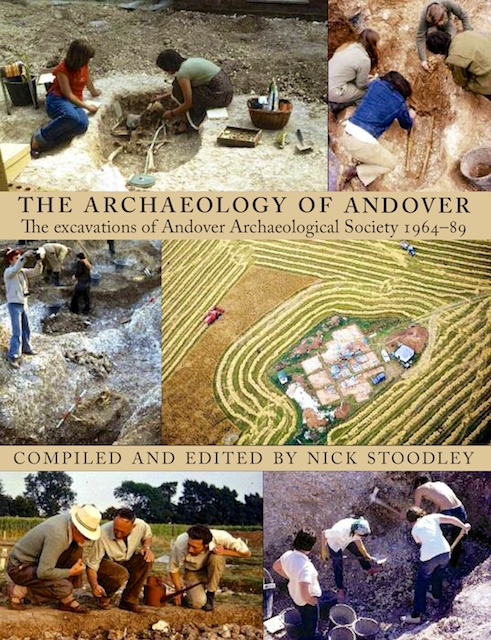
The Archaeology of Andover
The excavations of Andover Archaeological Society 1964–89
Nick Stoodley
Published for the Andover History and Archaeology Society
The Andover district is exceptionally rich in archaeology with many examples from Neolithic to Anglo-Saxon and medieval times. It has attracted many of the great names among archaeologists, including Barry Cunliffe’s well known work at Danebury. But when Andover began to expand in the 1960s it was the late Max Dacre, a self-taught amateur newcomer, and the Andover Archaeological Society he helped found who were the driving force in saving much from the developers’ bulldozers. He also found other promising sites in the surrounding countryside.
Max died before he could publish the stories of the digs he largely inspired. It has long been the ambition of the society’s successor, Andover History & Archaeology Society, to make his work more widely known. Max’s work has been professionally edited and written up by Dr Nick Stoodley FSA and publication of this book has been made possible with a vital grant from the Marc Fitch Fund. 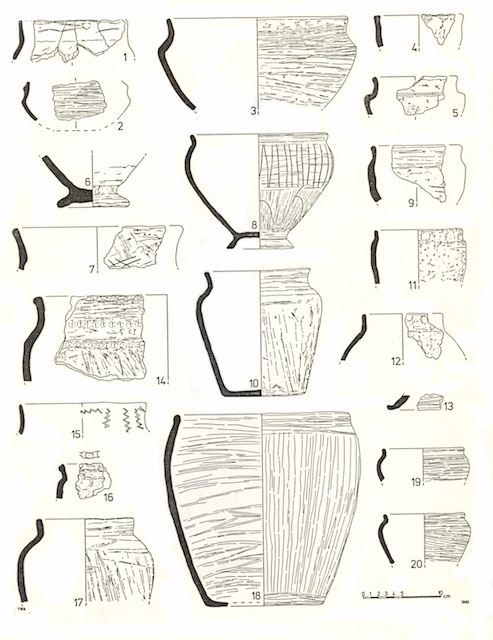 It is the only book to give a comprehensive and referenced overview of the Andover area’s fascinating past.
It is the only book to give a comprehensive and referenced overview of the Andover area’s fascinating past.
DR NICK STOODLEY is an honorary research fellow at the University of Winchester. He is a specialist on Anglo-Saxon archaeology with a particular interest in the burial archaeology of early Anglo-Saxon Wessex. His publications include a book on gender relations as expressed through early Anglo-Saxon burial, in addition to reports and articles on Anglo-Saxon cemeteries and mortuary practice. Nick is the production editor for the Proceedings of the Hampshire Field Club and Archaeological Society and a fellow of the Society of Antiquaries.
£20.00 (paper) December 2013
246x189 mm 128pp 51 line illustrations, 60 colour plates 978-1-903152-32-4
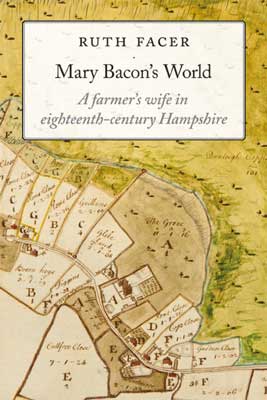
Mary Bacon’s World
A farmer’s wife in eighteenth-century Hampshire
Ruth Facer
‘what a delicious book this is. …through her record of every
point of interest in her daily life, she brings history to life for her
readers today, thanks to Ruth Facer’s diligence.’
Gwyn Rushton Alton Herald
Mary Bacon was an eighteenth century farmer’s wife whose life was spent in the north of Hampshire, Austen country, where she was a contemporary of the famous writer.
Ruth Facer unexpectedly discovered Mary’s farm ledger, a 300-page document that was not only used for farming accounts. Its pages are filled with anything that caught Mary’s fancy – religious musings, recipes, cures for both humans and animals, weather reports, and almanac material, among other subjects.
This book provides a fascinating insight into the world of an eighteenth-century farmer's family.
£15.00 (paper) 2010 234x156 mm 342pp 978-1-903152-28-7
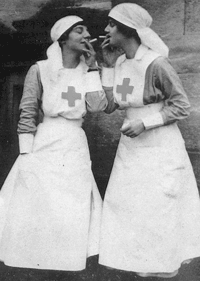
Angels and Citizens
British Women as Military Nurses 1854–1914
Anne Summers
The authoritative history of the origins of British military nursing.
a tour de force that will set a standard for years to come
Susan M. Reverby Social History of Medicine
a fascinating study of popular consciousness
Regina Morantz-Sanchez Women’s Review of Books
Anne Summers combines a detailed account of the origins and development of the regular Army Nursing Service and its successor, the Queen Alexandra’s Imperial Military Nursing Service, with a narrative of the early years of the Red Cross and the experiences and adventures of women volunteers in the international war relief movement.
Long before the electoral process gave them the vote, wars offered women many of the social rewards the vote symbolised: valued occupations, badges of honour and distinction, and a recognised position in the machinery of state. War represented an irresistible combination of citizenship, social legitimation, and personal challenge. As Summers shows, the figure of the war nurse was full of paradoxes: a symbol of motherhood and domesticity, required to play a part on the international stage; a symbol of healing, required to collaborate with a strategy of collective slaughter; a symbol of service and self-abnegation, encouraged to show pluck, initiative and responsibility.
This story of the feminisation of a formerly male profession and the militarisation of the quintessentially civilian sector of society makes a vital contribution to our understanding of the public roles of women in the 20th century. It illuminates not only the failure of the pre-war feminist movement to construct a pacifist platform, but also the wholehearted and fatal mobilisation of western Europe for the catastrophe of World War I.
£24.50 (paper) 2000 234x156 mm 342pp 978-1-903152-02-7
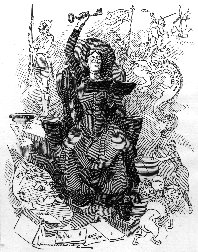
Female Lives, Moral States
Women, Religion and Political Culture in Britain 1800–1930
Anne Summers
The private lives and religious impulses of the women who shaped nineteenth century philanthropy.
[Anne Summers] brings the methods of a social historian to a subject with which many cultural historians are engaged.
Jane Rendall
These studies of key nineteenth century women show both the importance and complexity of religion in personal and organisational life. Using the ‘exemplary lives’ of Elizabeth Fry, Josephine Butler and Florence Nightingale, alongside case studies of prison reform, nursing, and the religious sisterhood movement (as well as the campaigns against double standards in sexual morality) Anne Summers analyses how religion, politics and medical discourse were interwoven in the new female social roles.
Female Lives, Moral States argues that the 19th century drew new distinctions between public and private spheres for women and men. A study of female ‘lineages’ of social action, involving a close reading of contemporary texts, suggests radically different definitions of ‘public’ and ‘civil’ society from those formulated in the influential writings of Jürgen Habermas. This major contribution to the history of a society making the rapid transition to modernity illustrates the essential connections between urban religion, philanthropy and feminism and the evolution of the concept of citizenship.
£24.50 (paper) 2000 234 x 156 mm 192pp 978-1-903152-03-4
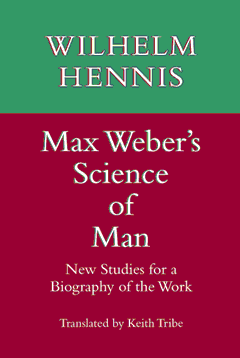
Max Weber’s Science of Man
Wilhelm Hennis
translated by Keith Tribe
In his new book Wilhelm Hennis continues his argument against received wisdom in the understanding of Max Weber. He seeks to rescue the work of this important thinker from sociologists and systems-theorists, demonstrating an essential continuity throughout Weber’s work in his concern with the pervasive force of economic calculation and material rationality in the shaping of ‘man’.
Ranging widely over the work of Weber’s contemporaries, and making use of Weber’s unpublished papers and correspondence, Hennis provides an elegant and eloquent account of the motive of Weber’s scholarship. He demonstrates how a better understanding of Weber in his own context can present us with a figure who can still teach us, as he sought to teach his own contemporaries.
Hennis wanders the far-flung shores of Weber’s oeuvre and brings back nuggets of textual gold with which to dazzle the reader. His method, he says, is not a reconstruction rather it is a true appreciation of the full range of the work and a matter of judgement, of correctly divining the centre of gravity of Weber’s work.
…Hennis should take some comfort that the memory of the authentic Weber has been given a further lease through these essays.
Sam Whimster, reviewing the original German edition
Max Weber’s Central Question and Max Weber’s Science of Man… reassert a fundamental dimension of Weber’s thought. …without these books that debate, which was visceral for Karl Löwith and Karl Jaspers, might never have been revived. We can be grateful for the tenacity with which Wilhelm Hennis has sought to identify Weber’s project and for what Hennis’s heart has led him to see.
Peter Baehr Political Theory
Read contents and extracts from Chapters One and Five.
£28.50 Paper 2000 234 x 156 mm 240pp ISBN 978-1-903152-00-3
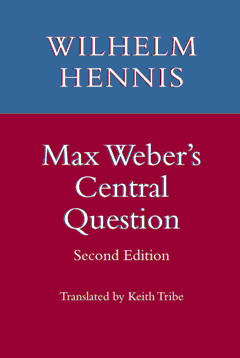
Max Weber’s Central Question
Wilhelm Hennis
translated by Keith Tribe
Originally published in English as Max Weber, Essays in Reconstruction
The revised and reset second edition includes Hennis’ autobiographical essay Political Science as a Vocation: A Personal Account
In his first book to appear in English, Wilhelm Hennis argues that Weber’s ideas have been distorted by both German- and English-speaking sociologists. In his view the ‘Weber revival’ of recent years has a textual basis that is narrow and partial, imputes modern concerns to Weber and treats the position of Weber as a ‘founding father’ of sociology as unproblematic.
Hennis’ work enables a space for critical analysis of sociology, of the modernist reception of Weber. In the process, the vigour and passion of Weber as person and scholar emerges and cannot fail to inspire. It is clear that what Hennis is writing about goes right to the heart of the central questions in Weber studies today.
David Chalcraft Max Weber Studies
Hennis’ hugely influential (book) …returned to the world of social science a humanist conceptualisation of Weber.
...Hennis, in the range of his scholarship, his openness to the western canon of philosophy and politics and his rhetorical gifts of writing, does amaze.
Sam Whimster Aldgate Papers in Social and Cultural Theory
Read contents and an extract from Chapter One.
£28.50 Paper 2000 234 x 156 mm 256 pp 978-1-903152-01-0
The author
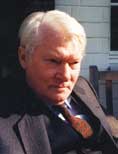
Born in 1923, Wilhelm Hennis (right) served in the German navy during the war, after which he studied law at Göttingen. During 1951 and 1952 he was parliamentary assistant to Adolf Arndt, legal adviser to the SPD, and research assistant to Carlo Schmid at Frankfurt University from 1953 to 1960.
From 1967 until his retirement in 1988 he was Professor of Political Science at the University of Freiburg. He lived in Freiburg, an acerbic commentator upon modern politics, until his death in November 2012.
The translator
Born in 1949, Keith Tribe studied social sciences and economic history at the Universities of Essex and Cambridge, and was appointed to Keele University in 1976, where he is now Reader in Economics. From 1979 to 1984 he was a visiting research fellow at the University of Heidelberg and the Max Planck Institut für Geschichte, Göttingen.

 It is the only book to give a comprehensive and referenced overview of the Andover area’s fascinating past.
It is the only book to give a comprehensive and referenced overview of the Andover area’s fascinating past.




